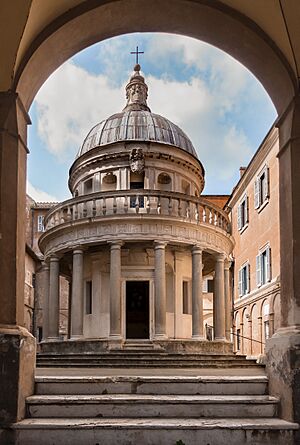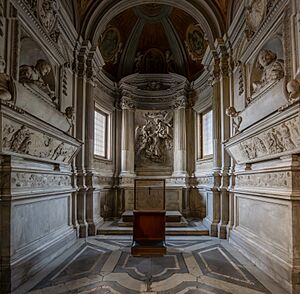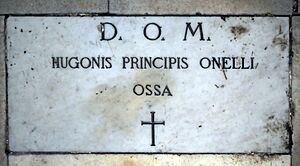San Pietro in Montorio facts for kids
Quick facts for kids San Pietro in Montorio |
|
|---|---|
| Chiesa di San Pietro in Montorio | |
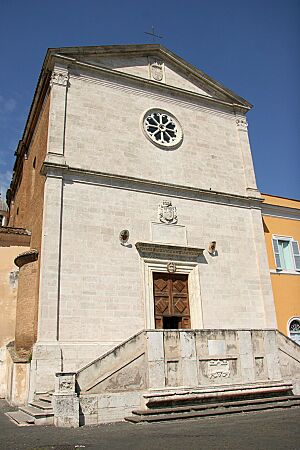
Façade
|
|
| 41°53′19″N 12°28′00″E / 41.8886°N 12.4666°E | |
| Location | Piazza di S. Pietro in Montorio 2, Rome |
| Country | Italy |
| Denomination | Roman Catholic |
| Tradition | Roman Rite |
| Website | , unsafe |
| History | |
| Status | Titular church, national church |
| Dedication | Saint Peter |
| Consecrated | 1500 |
| Architecture | |
| Architect(s) | Donato Bramante |
| Architectural type | Church |
| Groundbreaking | 1481 |
| Administration | |
| District | Lazio |
San Pietro in Montorio (which means "Saint Peter on the Golden Mountain" in English) is a famous church located in Rome, Italy. In its courtyard, you can find the Tempietto, a small, special building designed by the architect Donato Bramante. This church is an important historical and artistic site.
Contents
History of San Pietro in Montorio
The Church of San Pietro in Montorio was built on a very old site. There was an earlier church from the 800s dedicated to Saint Peter here. This church is believed to mark the place where Saint Peter was crucified.
In the 1400s, the old church was rebuilt. This was made possible by generous funding from King Ferdinand and Queen Isabella of Spain. The new church was officially opened in the year 1500 by Pope Alexander VI.
Today, San Pietro in Montorio is a titular church. This means it is linked to a specific cardinal, who is a high-ranking official in the Catholic Church. Since 2008, James Francis Stafford has been the cardinal connected to this church.
Exploring the Church's Interior
The inside of San Pietro in Montorio is filled with amazing artworks by famous artists from the 1500s and 1600s.
- Main Altar Art:
* A very famous painting by Raphael called Transfiguration used to be above the main altar. It was moved to the Vatican in 1797. * Now, you can see a copy of Guido Reni's painting Crucifixion of St. Peter there. The original is also in the Vatican Museums. * It is also traditionally believed that Beatrice Cenci, a well-known historical figure, is buried beneath the main altar.
- First Chapel on the Right: This chapel features two paintings by Sebastiano del Piombo: Flagellation and Transfiguration, created between 1516 and 1524. Interestingly, Michelangelo helped Sebastiano by providing drawings for the Flagellation painting.
- Second Chapel: Here, you'll find a fresco by Niccolò Circignani from 1554. There are also some older frescoes from the school of Pinturicchio and an allegorical painting thought to be by Baldassare Peruzzi.
- Fourth and Fifth Chapels: These chapels have ceiling frescoes by Giorgio Vasari. The fifth chapel's ceiling shows the Conversion of St. Paul. This chapel also contains a monument by Bartolomeo Ammannati.
- Last Chapel on the Left: This chapel has a painting called Baptism of Christ, which is thought to be by Daniele da Volterra. It also has beautiful stucco work and ceiling frescoes by Giulio Mazzoni.
- Third Chapel: A student of Antoniazzo Romano painted the Saint Anne, Virgin, and Child fresco in this chapel.
- Pietà Chapel: Dirck van Baburen, a Dutch artist, painted Entombment for this chapel. He worked with another Dutch artist, David de Haen, here. Other paintings in this chapel are attributed to one or both of these artists.
- Raimondi Chapel: Designed by the famous Gian Lorenzo Bernini in 1640, this chapel includes Saint Francis in Ecstasy by Francesco Baratta and sculptures by other artists.
Tombs of Irish Chieftains
At the main altar of the church, you can find the tombs of several important Irish noblemen. These include Hugh O'Neill, Earl of Tyrone, and his son, as well as Rory O'Donnell, 1st Earl of Tyrconnell, and his brother Cathbharr.
In 1607, these Irish leaders, along with many followers, left Ireland due to conflicts with the English government. This event is known as the Flight of the Earls. Sadly, Tyrconnell and Cathbharr died in 1608, and Hugh O'Neill's son died in 1609, all from a fever, likely malaria. Their tombs are covered with special marble slabs that have colorful borders and family crests.
Hugh O'Neill himself died in 1616 and was also buried in the church. His original tombstone was lost, but the words on it were saved: "Dedicated to God the Best and Greatest. The bones of Prince Hugh O'Neill." In 1989, a new marble plaque with this same inscription was placed near the original spot.
The Tempietto
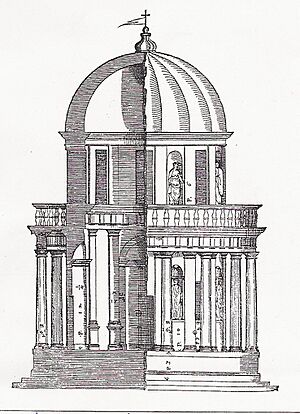
The Tempietto (which means "small temple") is a small, round building located in the courtyard of San Pietro in Montorio. It was designed by Donato Bramante and possibly built as early as 1502. The kings of Spain, Ferdinand and Isabella, asked for it to be built.
The Tempietto is considered a masterpiece of the High Renaissance in Italian architecture. It was built to mark the exact spot where Saint Peter is believed to have been crucified.
Images for kids
See also
 In Spanish: San Pietro in Montorio para niños
In Spanish: San Pietro in Montorio para niños
 | George Robert Carruthers |
 | Patricia Bath |
 | Jan Ernst Matzeliger |
 | Alexander Miles |


